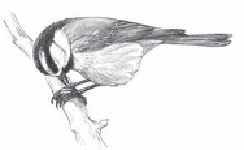Biology Reference
In-Depth Information
CHAPTER
1
Guess Who's Coming to Dinner? The Art of Bird Feeding
In 2006, Americans spent about $4 billion on bird seed and other food for wild birds
and other animals. To put this in perspective, that same year they spent $7.1 billion
on plasma TV sets, $11 billion on bottled water, $13.5 billion on home video and com-
puter games, $24.1 billion on DVD rentals and purchases, and $58.5 billion on wed-
dings. But that's still a lot of bird seed!
People who spend their hard-earned dollars feeding birds want to ensure that they
are helping, not hurting, them. And naturally we also want to provide food for the
birds we most enjoy watching, like chickadees and cardinals. Many people consider
squirrels and blackbirds to be nuisances. Some communities fine people if pigeons
visit their feeders. Small wonder that I get hundreds of questions about bird feeding
every year!
Feeding Backyard Birds
Q I love watching the birds that visit my feeders in winter, but I worry that the birds
might become too dependent on me. Is it okay to keep feeding them?
A
Yes.Astudyof348color-bandedBlack-cappedChickadeesinWisconsinfoundthatthe
birds took only about 21 percent of their daily energy from feeders. The study concluded
thatalthoughnaturalfoodsuppliedmostoftheirneeds,feedersprovidedanimportantsup-
plement to their natural diet. The same researchers found that Black-capped Chickadees
with access to feeders were more likely to survive very harsh winters. So your feeders can
make tough times easier for the birds, but even when they visit feeders regularly, the birds
still know how to find natural sources of food.
Q It seems like a bad idea to feed birds during spring, summer, and fall. Doesn't it
turn them into moochers and mess up their urge to migrate?





